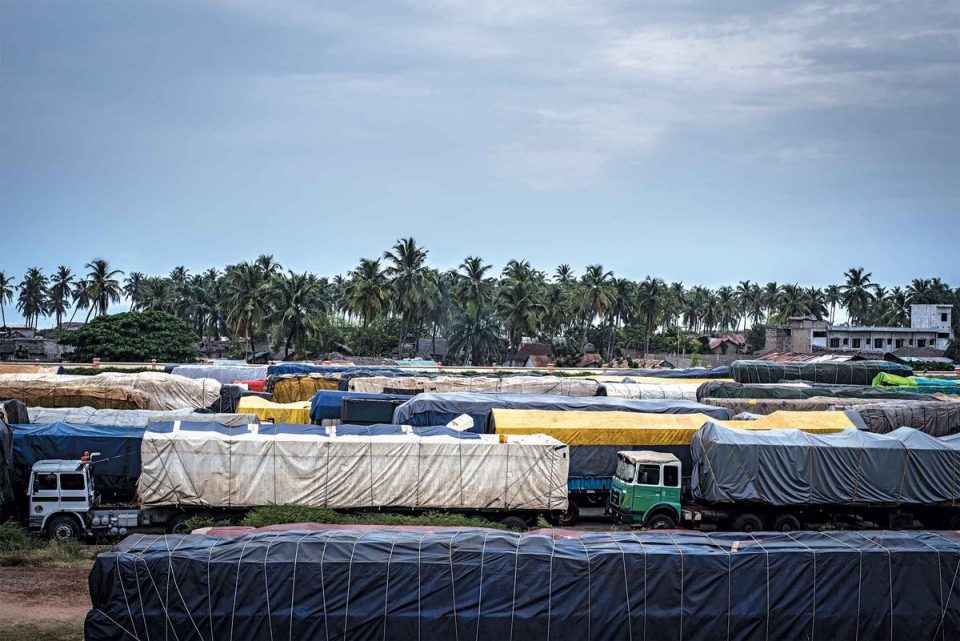African countries are trying to tear down barriers to commerce through a continent-wide trade pact, but developments in West Africa show some immediate neighbors prefer to keep the fences up.
While 54 of the 55 countries recognized by the African Union have signed the agreement that’s expected to eliminate cross-border tariffs on 90% of goods and facilitate movement of money and people, some 27 members have yet to ratify it, including Nigeria, the continent’s biggest economy.
Hundreds of trucks have been parked at Benin’s border with eastern neighbor Nigeria for more than a year. That’s because the government in Abuja abruptly curbed imports in a move to throttle widespread smuggling of products that were sabotaging local industries and inflaming insecurity. Companies have had to resort to Lagos’ congested port — bedeviled by delays and inefficiencies — to move goods.
Nigeria hasn’t budged from its position despite negotiations, and traders within the country and in neighboring nations are reeling from the impact of the move that’s spurred diplomatic rifts. Making economic matters worse, protests in Lagos in recent days are causing wider concerns about civil unrest in Africa’s most-populous city.
In Ghana’s capital, Accra, officials have shut Nigerian-owned stores to comply with a law that restricts foreign participation in its retail trade. A meeting between presidents of both countries in September didn’t yield a resolution.
The difficult relationship between West Africa’s leading Anglophone countries dates back to 1969, when Ghana issued an alien expulsion order that affected mostly Nigerians. In turn, Nigeria repeated the same for Ghana in 1983 after international oil markets crashed and thousands of Ghanaians working in the industry returned home.
The latest actions embody the hurdles that must be overcome if Africa is to fulfill its vision of instituting a continental free-trade agreement. For now, protectionism remains the name of the game for West Africa’s economic powerhouses, whose governments are preoccupied with overcoming the devastation wrought by the coronavirus.
—Tope Alake in Lagos
Charted Territory

South Korea’s early trade data showed exports falling in October driven by fewer working days, while daily average shipments continued to recover on resilient tech demand. Exports fell 5.8% in the first 20 days of the month from a year earlier, according to customs office data released Wednesday.
Today’s Must Reads
- Key stage | The U.S. and Europe are heading for a clash over their preferred candidates to lead the World Trade Organization as the selection of the first woman to run the referee of global commerce enters a pivotal phase.
- Not prepared | About half of U.K. firms are less prepared for Brexit compared to last year due to the impact of the coronavirus pandemic, a sign of Britain’s vulnerability to disruption when it quits the European Union’s single market and customs union at year-end.
- Rights abuses | The U.S. said it found “conclusive evidence” that a Chinese company used forced labor to make extracts of the sweetener stevia, with American ports now directed to seize any shipments.
- Bouncing back | Global trade is staging what the United Nations termed a “fragile recovery,” as economies battered by the pandemic claw their way back to full activity.
- Speedier delivery | The U.S. Postal Service still isn’t processing election mail on time, even after being ordered by judges to halt disruptive changes like banning worker overtime and late delivery trips, Pennsylvania’s attorney general told a judge.
- United for autos | Four years of trade wars, tweets and fights over emissions regulations under Trump have fractured the auto industry’s once-reliable unified front.
On the Bloomberg Terminal
- Green light | Canadian Pacific’s precision-scheduled railroading and a focus on cost controls has helped it quickly adjust resources to lower volume, root out network inefficiencies and minimize margin compression, which could accelerate earnings growth in 2021, Bloomberg Intelligence says.
- Data dashboard | See Bloomberg Economics’s latest editions of high-frequency economic-data dashboards to track the recoveries of many countries.
- Use the AHOY function to track global commodities trade flows.
- Click HERE for automated stories about supply chains.
- See BNEF for BloombergNEF’s analysis of clean energy, advanced transport, digital industry, innovative materials, and commodities.
- Click VRUS on the terminal for news and data on the coronavirus and here for maps and charts.
Like Supply Lines?
Don’t keep it to yourself. Colleagues and friends can sign up here. We also publish Balance of Power, a daily briefing on the latest in global politics.
For even more: Follow @economics on Twitter and subscribe to Bloomberg All Access for full global news coverage and two in-depth daily newsletters, The Bloomberg Open and The Bloomberg Close.
How are we doing? We want to hear what you think about this newsletter. Let our trade tsar know.


